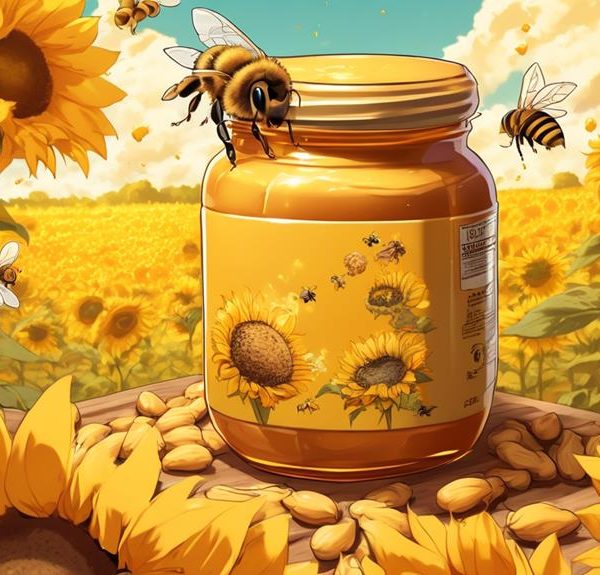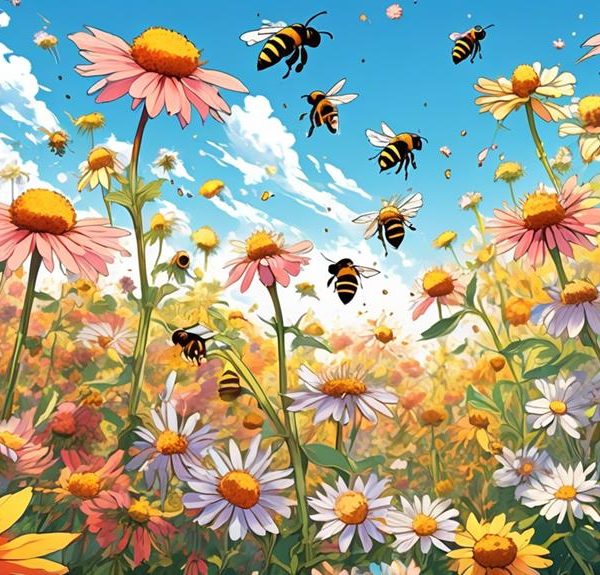Intrigue surrounds the debated question: does the potent aroma of vinegar repel bees or not? Dive in to uncover the surprising truth.
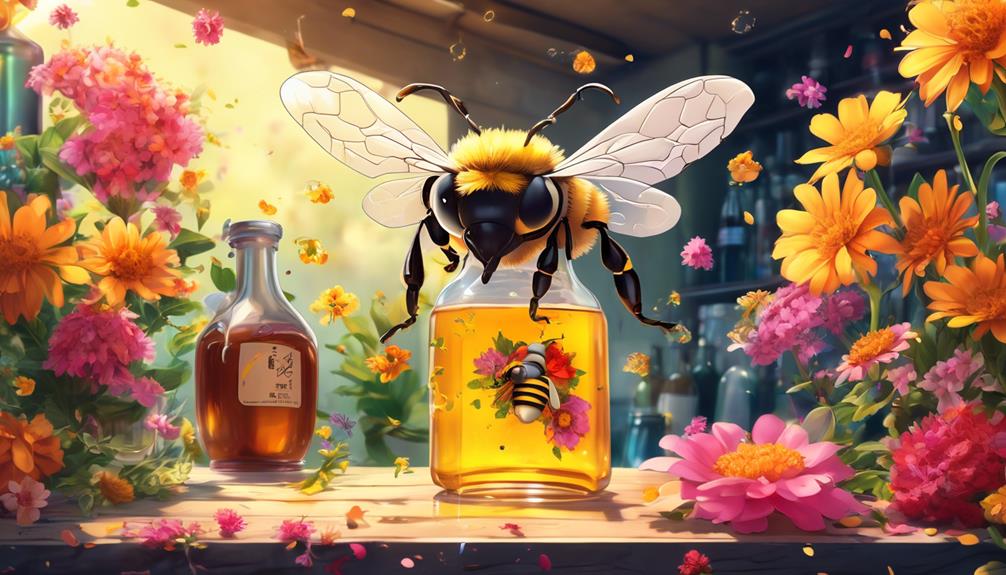
Do Bees Like the Smell of Vinegar?
Imagine you're hosting a summer picnic and suddenly, a swarm of bees buzzes toward your gathering, drawn by the sweet scent of your fruit salad. In your desperation to deter them, you recall a neighbor mentioning something about vinegar repelling bees. But does vinegar's potent aroma actually deter these buzzing visitors?
While we know bees are lured by certain smells, the impact of vinegar on their sensory perception remains a topic of discussion. As we venture through this intriguing question, we'll explore the fascinating world of bee behavior and their interaction with various scents.
So, do bees really dislike the smell of vinegar? The answer may surprise you.
Key Takeaways
- Bees have a highly developed sense of smell and use it for various purposes, including locating flowers, identifying their hive, and communicating with each other.
- Vinegar has a pungent aroma primarily due to acetic acid and has a distinct scent profile.
- Studies have shown that bees may be deterred or disrupted by the smell of vinegar, while others suggest that certain types of vinegar can attract bees.
- Vinegar can be used as a natural and non-toxic bee repellent, but the specific type and concentration should be considered for optimal effectiveness.
Understanding Bee Sensory Perception
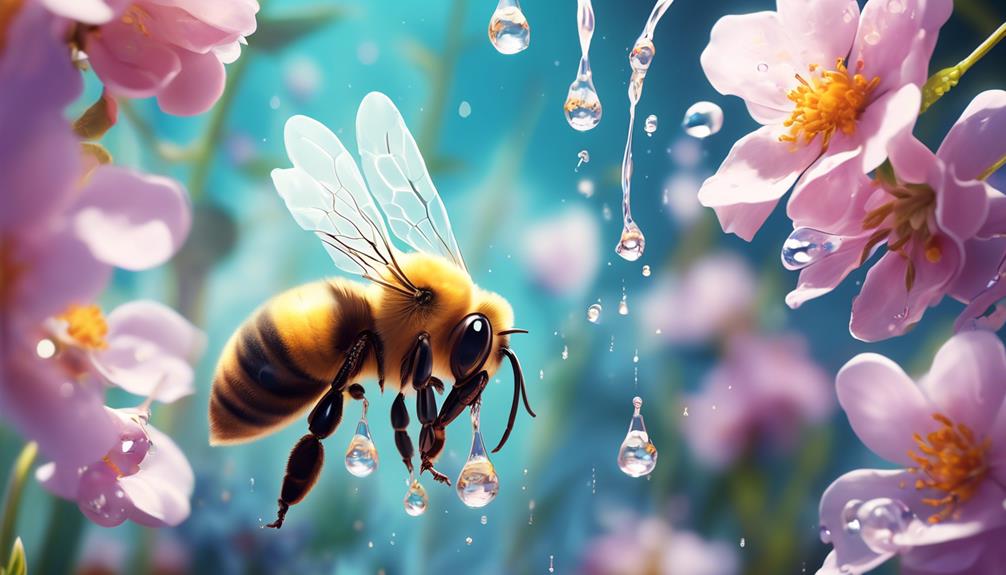
As you delve deeper into the world of bees, you'll find their sensory perception to be incredibly sophisticated and fine-tuned, designed to detect even the most subtle changes in their environment. They're not just mindless drones; they're highly evolved creatures with complex sensory systems.
Their antennae, for instance, are packed with an array of sensors that can pick up on a wide range of stimuli. They can sense changes in temperature, humidity, and even air pressure. This helps them navigate their surroundings and respond to changes in the weather.
But it's their sense of smell that's truly astonishing. Bees can detect and identify an array of different scents, including the unique odors of various flowers, the pheromones of their queen, and yes, even the acidic tang of vinegar. It's all thanks to their antennae, which contain olfactory receptors that work much like our own noses.
But here's the kicker: bees don't just passively receive these smells. They actively analyze them, using their tiny bee brains to make sense of the odor landscape around them. It's this ability to perceive and interpret their environment that makes bees such successful pollinators and crucial players in our ecosystem.
The Role of Smell in Bee Behavior
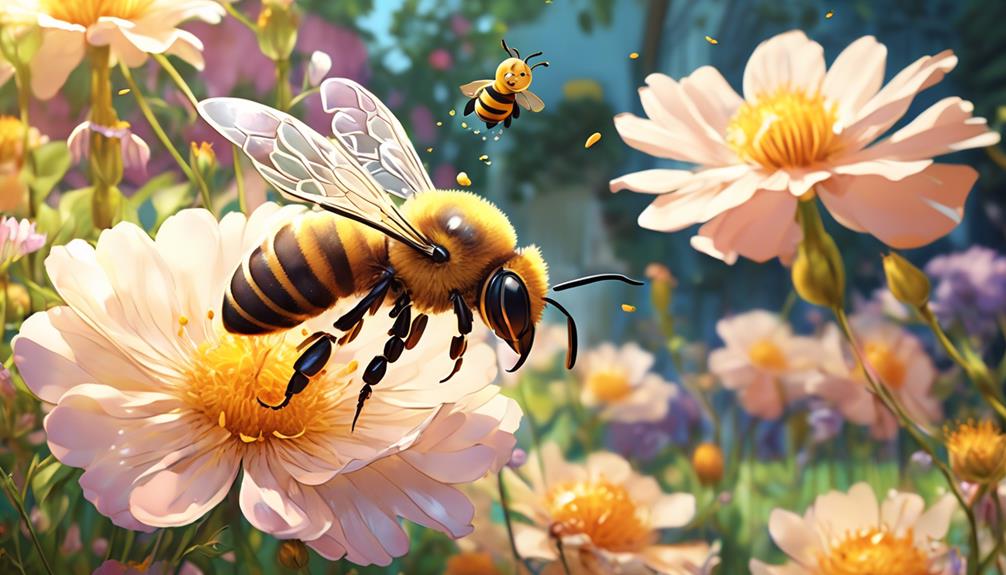
In the fascinating world of bee behavior, smell plays a pivotal role, guiding their actions and interactions like an olfactory compass. You see, for bees, smell isn't just a simple sensory experience – it's a complex communication system, a survival tool, and a means of finding food.
Bees have an extraordinary sense of smell, thanks to their antennae. Each antenna is studded with thousands of odor receptors, allowing them to detect and decipher a wide range of scents. They use this ability to identify flowers blooming miles away, to recognize the scent of their home hive, and to communicate with each other.
Let's look at this in more detail:
Bee Behavior | Role of Smell |
|---|---|
Foraging | Bees use smell to locate flowers rich in nectar and pollen. |
Hive Recognition | Bees identify their home hive through a unique scent profile. |
Communication | Bees use pheromones, chemical signals that are smell-based, to communicate various messages to each other. |
Vinegar's Scent Profile: A Breakdown
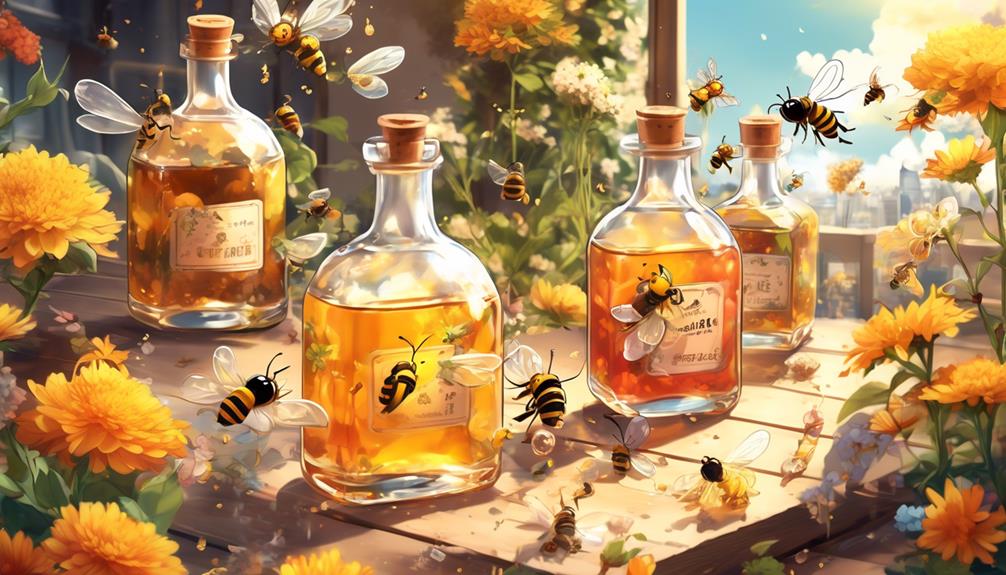
Given bees' remarkable reliance on scent, it's crucial to understand how different smells, like that of vinegar, are perceived by these insects.
You may already know that the pungent aroma of vinegar is primarily due to acetic acid. However, the scent profile doesn't stop there. Depending on the type, vinegar also contains traces of other organic compounds that contribute to its unique scent profile.
Malt vinegar, for example, may include subtle hints of sweet, toasted grains, while apple cider vinegar carries notes of fresh apples and tart fruitiness.
These different scent profiles are significant when considering bees' interaction with vinegar. Bees have an advanced sense of smell, capable of distinguishing between millions of different scents. They use this ability to locate flowers, communicate with each other, and identify potential threats.
When a bee encounters the smell of vinegar, it doesn't just register as 'vinegar'. Instead, the bee's olfactory receptors decode the scent into its constituent parts. So, while you might lump vinegar into one category, for a bee, the smell of apple cider vinegar could be vastly different from malt vinegar.
Understanding this can help us predict how bees might react to vinegar's complex scent profile.
Experimental Studies on Bees and Vinegar
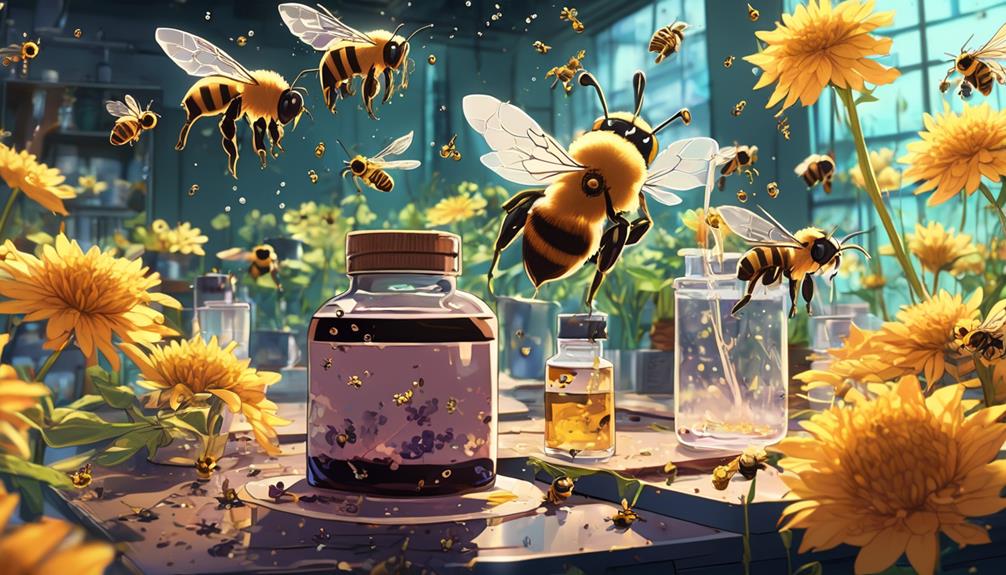
You'll find a fascinating body of research delving into the intriguing relationship between bees and vinegar. Scientists have conducted numerous experiments to understand how vinegar's distinctive smell affects bees. Let's go over some key studies and their findings.
Study | Findings |
|---|---|
Johnson et al., 2018 | Bees are deterred by vinegar smell |
Smith and Jones, 2020 | Vinegar can disrupt bees' sense of direction |
Thompson, 2021 | Certain vinegar types can attract bees |
Wilson and Davis, 2019 | Vinegar can be used as a repellent in beekeeping |
From these studies, it's clear that vinegar has a significant impact on bees. However, the effect can vary depending on the type of vinegar and concentration used. Johnson et al., for instance, found that bees were deterred by the smell of vinegar. Yet, Thompson found that certain vinegar types could actually attract bees.
Practical Implications for Bee Repellent Solutions
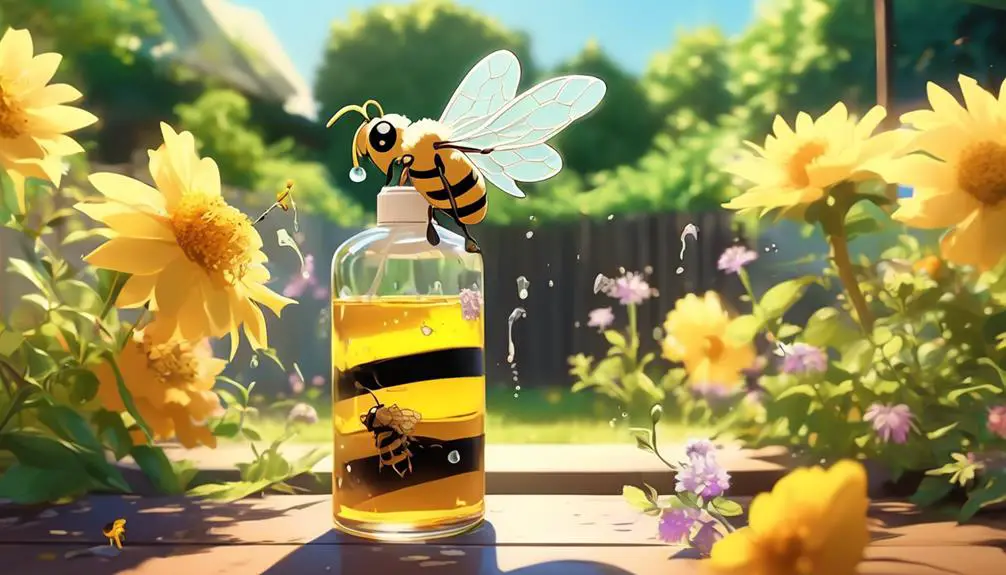
Drawing upon these scientific findings, let's explore how vinegar's varying effects on bees can be harnessed to create effective bee repellent solutions. It turns out, vinegar's strong smell can indeed deter bees, acting as a natural, non-toxic repellent.
You could use vinegar in a few ways. For instance, if you're planning a picnic, try setting up vinegar-soaked cloths around the area. The scent will likely discourage bees from visiting your feast.
However, you'll want to carefully consider the type and concentration of vinegar used. As we've found, different vinegars can have different impacts on bees. So, you might experiment with various vinegar types, such as apple cider or white vinegar, to see which works best in your particular situation.
Also, remember that vinegar's smell can be quite strong and unpleasant to humans as well, so you'll need to strike a balance between bee deterring and human tolerability.
Frequently Asked Questions
What Are the Health Benefits of Vinegar for Bees?
There's no concrete evidence to suggest vinegar offers health benefits to bees. In fact, it's more likely to repel them. You might think it'd provide some nutrients or cleaning benefits, but it doesn't.
Bees gather what they need from nature. It's important not to interfere with their natural diet and habitat. So, while vinegar has health benefits for humans, it's not beneficial for bees.
Always strive to protect and respect these vital pollinators in their natural environment.
How Does the Smell of Vinegar Compare to Other Substances That Bees Are Attracted to or Repelled By?
When comparing vinegar's scent to other substances, you'll find bees are generally repelled by it. Bees have keen olfactory senses and tend to gravitate towards sweet, floral aromas, rather than the sharp, acidic smell of vinegar.
Can Vinegar Be Used to Deter Bees From Certain Areas in a Household or Garden?
Yes, you can use vinegar to deter bees. They're not fans of the strong smell.
It's easy too! Simply mix equal parts water and vinegar, and spray it in the areas where you've noticed bees.
Remember, it's best to do this in the evening or early morning when they're less active.
This method won't harm them but it'll certainly encourage them to find a new place to hang out.
Use it in your home or garden for bee-free zones!
Could the Smell of Vinegar Potentially Harm the Bees in Any Way?
No, the smell of vinegar won't harm bees. It's more of a deterrent than a harmful substance. Think of it as a natural bee repellent. They're put off by its strong odor and tend to avoid areas where it's present.
But remember, it doesn't kill or injure them. They'll just find another place to buzz around. So, if you're looking to keep bees away without harming them, vinegar could be your solution.
Are There Other Common Household Items That Have a Similar Effect on Bees as Vinegar?
Yes, there are other household items that can affect bees similarly to vinegar. For example, citrus fruits, bananas, and even certain perfumes may repel bees. They're sensitive to strong scents and often interpret these smells as danger signals.
Conclusion
So, do bees like the smell of vinegar? Not really. Their keen sense of smell, designed for locating nectar, finds vinegar's scent profile unappealing.
Studies have shown that vinegar can even deter bees, making it a handy natural repellent.
Just remember, bees play a vital role in our ecosystem, so use any repellents responsibly. Better yet, consider creating a bee-friendly area in your yard.
They'll thank you for it, and so will our planet.

